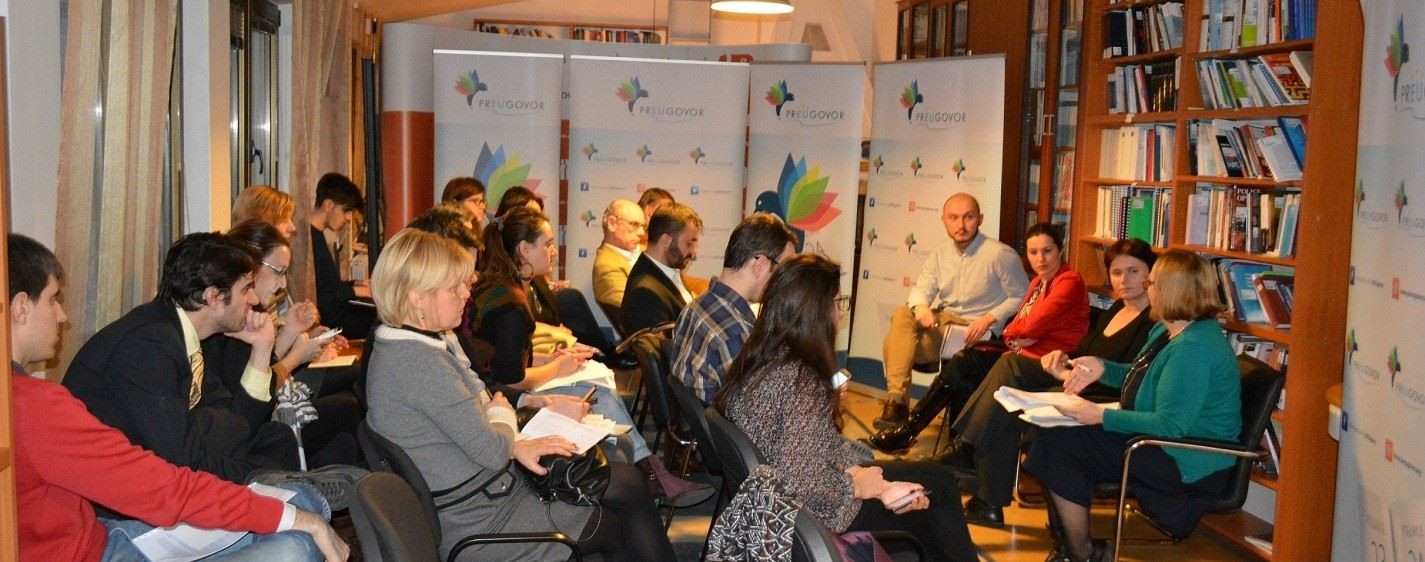Participants concluded that it seems like legal solutions are adopted taking into account international conventions, in order to demonstrate democratic progress and development to the international community, however, adopted solutions are rarely implemented in practice.
The process of the inclusion of public in drafting new laws on the police, public assembly and peace and order, was uneven and untimely, it was the conclusion of the fourth CHATvrtak coalition prEUgovor organized on January 28th 2016, in BCSP library.
Sonja Stojanović Gajić from BCSP, Vanja Macanović from the Autonomous Women Center and Katarina Golubović from the Lawyers’ Committee for Human Rights YUCOM talked about their experience from participation in legislative process and gave critical review of the adopted solutions.
Speaking about the Law on Public Assembly, panelists pointed out that NGOs submitted an appeal to the Constitutional Court, which led to the initiation of the procedure of determining the compliance of laws with the Constitution of Serbia. A large number of NGOs had been involved in the creation of the draft law on public assembly and in spite of many obstacles a significant number of complaints was taken into account.
The law restrains the right of public assembly
The law on public assembly was improved, but it leaves space to tacitly deny legal protection, it was highlighted at the meeting. There is a noticeable lack of definition and regulation of spontaneous gatherings, deadlines for submission of solutions on public gatherings are not regulated, deadlines for addressing the second instance body are not specified, and are often quite limited in terms of time and place. General prohibitions that have emerged in the new Law on Public Assembly are not in compliance both with international standards and the Constitution of Serbia, and moreover, high fines as a new legal measure have a negative impact on the right of public assembly, panelists evaluated.
During the discussion on the Law on Police it was pointed out that there was no feedback on the remarks of NGOs on the draft law, there was no timely update of information on modifications of the draft law, and the process was additionally hindered by the lack of coordination within the Ministry of Interior. Good solutions in the new law were listed: harmonization of the functioning of the Ministry of Interior with the rest of the state administration by making a distinction between state officials and police officers, defining the ways of recruitment and promotion, as well as the fact that internal and public competitions have now become mandatory. It was emphasized that CSO proposals, related to the improvement of parliamentary control and oversight of the police work, were adopted in its entirety.
Police tasks should be defined
On the other hand, proposals regarding local security, as well as proposals for reducing excessive use of by-laws and acts passed by the Minister, were not accepted, the speakers assessed. Proposals to combine all of the individual organizational units of internal control and place them under the control of one body were not adopted, and it was pointed out that there is still no unified record of citizens' complaints. The new law provides for the establishment of "auxiliary police", whose functions and powers are not defined. The law also provides for the category of persons with special authorities to deal with other internal affairs, which is nowhere explained in detail. Speakers have concluded that it is crucial for MOI to make two important legal documents, that define police work and job in the police, publicly available.
Regarding the Law on public peace and order, panelists stressed that there was no timely information on the public hearing on the draft law, which is why most of civil society organizations were deprived of the opportunity to give comments and suggestions. The provisions on prostitution and beggary are perceived to be controversial, and the new law provides penalties for those who engage in prostitution, as well as for those who use these services. Order on urgent measures, which implies the removal of the perpetrator from the apartment by the police for a period not longer than 14 days, entered the parliamentary procedure in the form of an amendment thanks to the CSO initiative, but was rejected unfortunately, the panelists noted.
Every last Thursday of the month, Coalition prEUgovor organizes CHATvrtak-informal dialogue in accordance with the Chatham House Rule. The aim of this activity is to improve the dialogue between the representatives of the state, civil society organizations, academic institutions, embassies, international organizations, media and other public professionals interested in the implementation of policies in the field of the rule of law (Chapter 23) and freedom, security and justice (Chapter 24).
